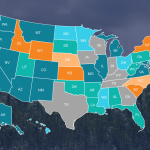The Southwest region of the United States encapsulates four states, Arizona, Texas, New Mexico, and Oklahoma, and is notable for sharing an international border with Mexico. The Southwest region appears to be moving toward full legalization with Arizona and New Mexico establishing medical cannabis programs at least a decade before recently legalizing adult-use. Texas is surrounded by other states with either full legalization or medical cannabis markets and seems likely to expand their medical program and may even legalize adult-use in the near future.
Arizona
The State of Arizona legalized medical cannabis in 2010 and voters approved Prop 207 to legalize adult-use in 2020. The rollout of adult-use last year was very rapid and may have impacted the security and recordkeeping compliance violations noted during recent state inspections. The start of adult-use has also led to back lash by opponents of Multi-State Operators overwhelming the state’s market and awareness of access issues faced by medical cannabis patients.
New Mexico
New Mexico has had legal medical cannabis since 2007 and legalized adult-use in 2021. Quick roll out of legalization following template of medical cannabis has resulted in many of the same patient access issues as Arizona. The New Mexico market is booming and draws customers from Texas and Mexico, but trafficking (likely to other states) is still a problem, as is access to medical cannabis especially for rural patients. The market is likely soon to be saturated, similar to Arizona.
Oklahoma
Oklahoma legalized medical cannabis in 2018 adopting a low-regulation “free market” approach with limited enforcement capacity, often dubbed the “Wild West” of cannabis. The result has been a surge in growers that is hugely disproportionate to the population, and an explosion of crime that has impacted farms, dispensaries, and customers. The market may be shrinking as growers leave the state due to falling prices in a saturated market and being uncompetitive against farms run by unregulated growers or organized crime. Legislators have begun to tackle the booming illegal marijuana market and associated black market crime through a series of initiatives and a new “12-point plan.” The plan includes instituting pre-license inspections and annual inspections, currently a major obstacle to enforcement. The plan also requires greater documentation as part of the application process, a tiered license fee schedule, and new reporting requirements on growers’ water and electricity use. There are also new packaging requirements and requirements to participate in the state seed-to-sale tracking system.
Texas
Residents in Texas have had limited access to medical cannabis under the Compassionate Use Program since 2015 but the program is currently being expanded to include more conditions and illnesses. In addition to the difficulties faced by providing access to rural patients in such a large state, there are many patients in highly-populated areas that lack regular access to medical cannabis since there are only 3 licensed dispensaries in the state. There are signs of a cultural shift toward greater cannabis acceptance among Texans, including local police departments opting not to enforce certain cannabis misdemeanors; decriminalization ballot initiatives by local advocacy groups; local politicians running on pro-cannabis platforms; and the Cannabis Policy Conference held at Texas A&M in early March. If the trend in the region of a roughly 10-year span between medical cannabis programs and adult-use holds, then it’s possible Texas will legalize in the next 3-5 years.
How Can Sapphire Risk Help?
Tony Gallo and the team of experts and consultants at Sapphire Risk Advisory Group have worked in 35 states and are excited to work in more states as the cannabis industry expands. Follow us on social media to stay up to date with more security best practices and cannabis industry updates!
- First Experiences: What Our Interns Learned From Entering The Cannabis Industry

- California Senate Bill 69 Adds CEQA Requirements for New Cultivators

- Top 5 Cannabis Security and Surveillance Violations

- Peace of Mind in the Retail Sector: Facility Security

- Opportunities in the Ohio (O-High-O) Cannabis Market

- Building Security and Trust: Verifying Identification and Payments

- The Importance of Loss Prevention

- Thoughts to Improve Cannabis Security Regulations Across the Nation

- Opportunities in the Minnesota Cannabis Market

- U.S. Cannabis Legalization 2023 Update


